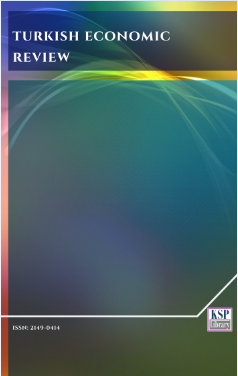Determinants of Bank Profitability in Turkey: An Empirical Analysis on Types of Banking from 2002 to 2012
Eşref Savaş BAŞÇI, Öznur SAKINÇ
Abstract
In this study, we investigate the determinants of banking profitability related to their financial statements. One of the major aim of financial systems is to make stability over the financial companies. Well known financial companies are Banks. If Banks make more profitable works, it can provide better effect to sector as an efficiency. The profitability of banks are more important for financial systems. Because of a lot of factors may affect to the banks as a widely way. Some researchers may emphasize banks earnings how it can improve which internal and external forces. Main studies are focused on banks financial statements. Therefore it is important how can we analyse their financial statements for evaluating profitability. With this current emphasis on financial statements are very important to both managing future and making new decision to guide. In Turkey, during from 2002 to 2012 period, bank’s profitability approaches has been changed to new phenomenon. Because of regulative decisions and competitive market has to change profitability of banking sectors. Therefore banking sector profitability are substantial for Turkey which to understand the determinants of all types of banks. On the other hand, financial atmosphere give priority to above changes for evaluating their performances. Therefore many studies were analysed profitability with various methods like ratio analyses, predicting regression model, simulation methods and etc. Some learning from expert’s experiences are rely on use of panel comparison with others about same historical infrastructure. In this study we examines types of banks as follows: 3 banks in state-owned banks, 12 banks in Private banks, 6 banks in foreign banks which has a branches in Turkey. In total 21 banks and 3 types analyses with cross-sectional panel data method during the from 2002 to 2012 period. In this study, we obtained data from Income Statements and Balance Sheets. As a result of panel data regression are statistically significant which Interest Income / Total Income and Consumer Loan/Total Loan are highly important to estimate ROE than estimating ROA.
Full Text:

References
Jain, S. B. (2012). A Comparative Study Of Performance Of Public Sector, New Private Sector And Old Private Sector Banks In India. Asia Pacific Journal Of Research In Business Management, 3(10), 1-2.
Karas, A. S. (2010). Are private banks more efficient than public banks? Economics Of Transition, 18(1), 209-244.
Nandi, J. (2013). Comparative Performance Analysis of Select Public and Private Sector Banks in India: An Application of CAMEL Model. Journal Of Institute Of Public Enterprise, 36(3/4), 1-28.
Shobhna, G. &. (2014). A Comparative Study of the Performance of Selected Indian Private and Public Sector Banks. IUP Journal Of Bank Management, 13(2), 64-83.
Swar, B. &. (2012). Determinants of Effective Service Delivery: A Study of Selected Public, Private and Foreign Sector Banks in Odisha. Business Perspectives & Research, 47-59.
Vyas, R. &. (2006). A comparative study of cross-selling practices in public and private sector banks in India. Journal Of Financial Services Marketing, 10(4), 123-134.
DOI:
http://dx.doi.org/10.1453/ter.v1i1.54
Refbacks
- There are currently no refbacks.
.......................................................................................................................................................................................................................................................................................................................................
Turkish Economic Review - Turk. Econ. Rev. - TER - www.kspjournals.org
ISSN: 2149-0414
Editor: ter@ksplibrary.org Secretarial: secretarial@ksplibrary.org Istanbul - Turkey.
Copyright © KSP Library





